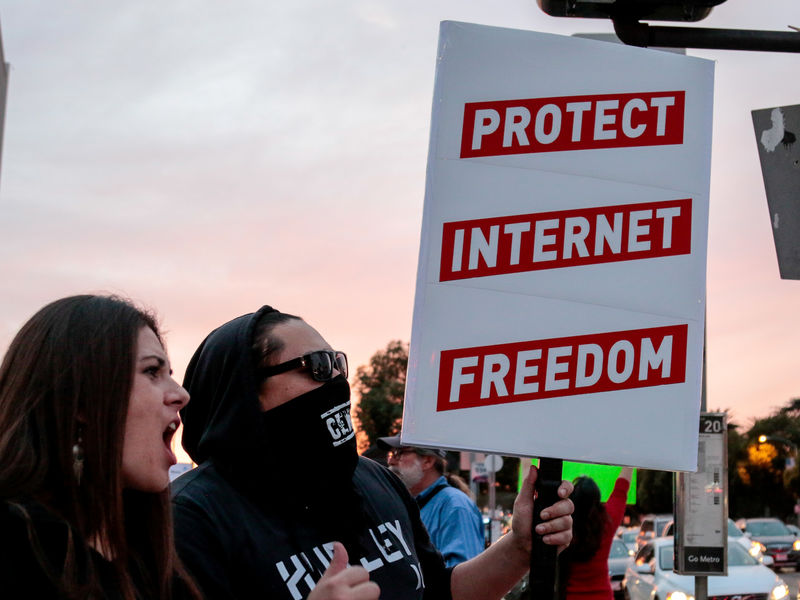U.S. sues after California governor signs 'net neutrality' law
Reuters
Published Sep 30, 2018 09:46PM ET

U.S. sues after California governor signs 'net neutrality' law
By David Shepardson
WASHINGTON (Reuters) - The U.S. Justice Department late on Sunday filed suit after California Governor Jerry Brown signed legislation to restore open internet protections known as net neutrality in the state after the Trump administration repealed the rules in December 2017.
This marked the latest clash between the Trump administration and California, which have sparred over environmental, immigration and other hot-button issues.
U.S. Attorney General Jeff Sessions said on Sunday in a statement that "states do not regulate interstate commerce — the federal government does. Once again the California legislature has enacted an extreme and illegal state law attempting to frustrate federal policy."
California’s net neutrality law is set to take effect on Jan. 1, but the Justice Department late Sunday in a court filing sought a preliminary injunction to block it from taking effect, warning that internet companies "cannot realistically comply with one set of standards in this area for California and another for the rest of the nation — especially when internet communications frequently cross multiple jurisdictions."
The government said that California sought to "second-guess" the federal government and warned "the effect of this state legislation would be to nullify federal law across the country."
In December, the Federal Communications Commission said in repealing the Obama-era rules that it was preempting states from setting their own rules governing internet access.
California Attorney General Xavier Becerra said on Sunday the Trump Administration was ignoring "millions of Americans who voiced strong support for net neutrality rules" while California, which is "home to countless start-ups, tech giants and nearly 40 million consumers - will not allow a handful of power brokers to dictate sources for information or the speed at which websites load."
The Trump administration rules were a win for providers like Comcast Corp (O:CMCSA), AT&T Inc (N:T) and Verizon Communications Inc (N:VZ), but the net neutrality repeal was opposed by internet companies like Facebook Inc (O:FB), Amazon.com Inc (O:AMZN) and Alphabet Inc (O:GOOGL).
In March, Brown accused the Trump administration of essentially declaring war on the most populous U.S. state after the Justice Department sued to stop policies that protect illegal immigrants against deportation.
Under President Donald Trump, the FCC voted 3-2 in December along party lines to reverse rules that barred internet service providers from blocking or throttling traffic or offering paid fast lanes, also known as paid prioritization.
FCC Chairman Ajit Pai, who led the effort to reverse net neutrality, said in a statement on Sunday that "not only is California’s internet regulation law illegal, it also hurts consumers. The law prohibits many free-data plans, which allow consumers to stream video, music, and the like exempt from any data limits."
Gigi Sohn, a former senior aide to FCC Chairman Tom Wheeler, who ran the agency when the net neutrality rules were adopted, said the California law "is now the model for all future state and federal legislation ... this is what internet users across the political spectrum have said they want by overwhelming majorities."
Jonathan Spalter, who heads USTelecom, an industry trade group, said California's law will not "help advance the promise and potential of California’s innovation DNA."
He argued that instead of 50 separate state laws, "we need Congress to step up with a national framework for the whole internet ecosystem and resolve this issue once and for all."
In August, 22 states and a coalition of trade groups representing major tech companies urged a federal appeals court to reinstate the rules. Oral arguments are set for February 1.
The U.S. Senate voted in May to reinstate the net neutrality rules, but the measure is unlikely to be approved by the House of Representatives and the White House also opposes it.

The FCC in December handed ISPs sweeping new powers to recast how Americans use the internet, as long as they disclose changes. The new rules took effect in June but providers have made no changes in access.
Written By: Reuters
Trading in financial instruments and/or cryptocurrencies involves high risks including the risk of losing some, or all, of your investment amount, and may not be suitable for all investors. Prices of cryptocurrencies are extremely volatile and may be affected by external factors such as financial, regulatory or political events. Trading on margin increases the financial risks.
Before deciding to trade in financial instrument or cryptocurrencies you should be fully informed of the risks and costs associated with trading the financial markets, carefully consider your investment objectives, level of experience, and risk appetite, and seek professional advice where needed.
Fusion Media would like to remind you that the data contained in this website is not necessarily real-time nor accurate. The data and prices on the website are not necessarily provided by any market or exchange, but may be provided by market makers, and so prices may not be accurate and may differ from the actual price at any given market, meaning prices are indicative and not appropriate for trading purposes. Fusion Media and any provider of the data contained in this website will not accept liability for any loss or damage as a result of your trading, or your reliance on the information contained within this website.
It is prohibited to use, store, reproduce, display, modify, transmit or distribute the data contained in this website without the explicit prior written permission of Fusion Media and/or the data provider. All intellectual property rights are reserved by the providers and/or the exchange providing the data contained in this website.
Fusion Media may be compensated by the advertisers that appear on the website, based on your interaction with the advertisements or advertisers.